Published Sep 25, 2014
EXCLUSIVE INTERVIEW: Nicholas Meyer on DST3 and Beyond
EXCLUSIVE INTERVIEW: Nicholas Meyer on DST3 and Beyond
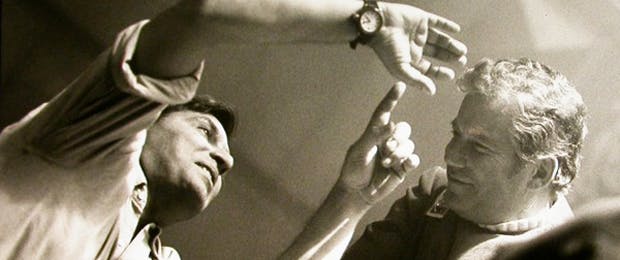
Star Trek is warping fast toward its 50th anniversary, and there are several behind-the-scenes figures without whom it wouldn’t be possible: Gene Roddenberry, Gene Coon, Harve Bennett, Rick Berman, Nicholas Meyer, Dorothy Fontana, Robert Justman and, yes, J.J. Abrams. Of those still alive, StarTrek.com has interviewed Bennett, Berman, Fontana and Abrams, but Meyer had eluded our grasp… until now. Meyer directed (and co-wrote, uncredited) Star Trek II: The Wrath of Khan, co-wrote Star Trek IV: The Voyage Home and co-wrote and directed Star Trek VI: The Undiscovered Country. He’d done plenty of strong work before hooking up with Trek (The Seven Percent Solution, Time After Time), did more in between Treks (The Day After) and has done even more since (Sommersby, The Odyssey, Elegy and Houdini), but most people, when they think of Meyer, associate him with Star Trek. In fact, he titled his memoir, “The View From the Bridge: Memories of Star Trek and a Life in Hollywood."
The writer-director-author will make a rare convention appearance next week when he takes the stage at Destination Star Trek 3 in London, and that upcoming event provided us with the long-awaited opportunity to speak with Meyer. Meyer talked frankly about his contributions to Star Trek, and he did so in detail, addressing so much ground that we’re running this interview over the course of three days. Below is part one, and visit StarTrek.com again tomorrow to read part two.

Let’s start in the present tense, before we dip into the past. You wrote Houdini, which just aired. How pleased were you with how that came together?
MEYER: Well, there are two versions of it. One is the international version, which is Lionsate, and the other is the History Channel version. And I much prefer the Lionsate version.
Really? How come?
MEYER: Well, they – you know, sort of re-cut the movie, and tore a lot of it out, and put in a lot of voiceovers and stuff that I just wasn’t crazy about. And wasn’t our intention. It hadn’t been written.
And then what else are you working on at the moment?
MEYER: I’m working on a television series called Freud: The Secret Casebook for CBS. It’s a pilot, and I hope it’s a whole series, actually. I’m an executive producer of it with Frank Spotnitz. We’re doing it together. And at the moment, I’m writing the first two episodes. The pilot and the first episode. And, down the line, I might direct one of them.
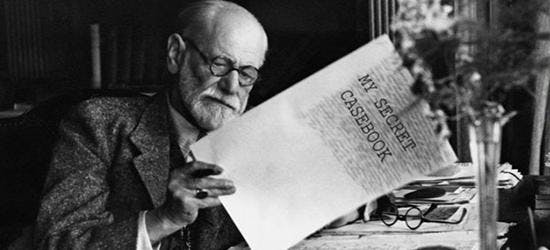
Do you have a Freud lined up already, or no?
MEYER: No, that’s next.
You’re going to be in London for the Destination Star Trek 3 event, which is why we’re on the phone. How many conventions have you done in the past, and what kinds of experiences have those been for you in general?
MEYER: I think I’ve done two in my life. One was many, many, many years ago, in Pasadena. I think that was one. And I went because it was so easy to go. I just could drive there. And then I went to one… a few years back, there was one in Las Vegas. And I don't remember much about it because I think I wasn’t feeling very well for a lot of it. It just was a nice change of pace, I guess. And this time, I have other business in London, so it just worked out.
Star Trek is fast approaching its 50th anniversary, and there are a lot of people out there who do not think it would have gotten this far as an ongoing franchise were it not for the work you did on II, IV and VI. So, as modest or as modestly or immodestly as you can answer this, what do you see as your role in Trek history?
MEYER: Well, partially, it was a matter of being in the right place at the right time. And the other thing – and this is just, you know, one person’s opinion, but artists lose all proprietary authority or insight into their creations when they’re finished. So, my opinion is just another opinion. But I think it probably helped at the time that I didn’t know anything about Star Trek. And so, I could sort of reinvent it, in my own image. And my own image was that it was a story about the Navy. And I think coming to it from that perspective may have given the whole thing a shot in the arm, and just sort of another way of going about it.
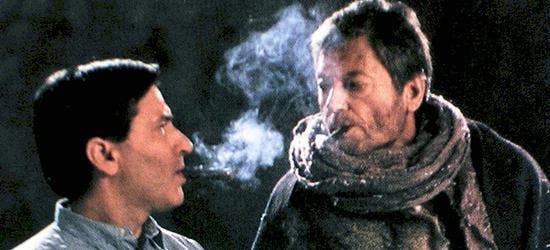
Now, you did not know The Original Series at all, obviously, as you say, when you got involved in Trek II. You started to touch on how it kind of gave you a clean slate to do things your way, but, how’d you even get involved? Why did they say, “Yeah, we’ll go with this guy?”
MEYER: I had made Time After Time, and I was looking for my next project. And I wanted to make a film of the Robertson Davies novel, Fifth Business. And I had written the screenplay. And nobody was interested in doing this. And I was just kind of sulking in my house, waiting for someone to write me a check. And it was a Sunday, and I was flipping burgers with two friends of mine in the backyard. And one of these was a woman named Karen Moore, who was, at the time, an executive at Paramount. I’d known her since we were both kids. And she sort of gave me a stern talking to, and said, “You know, Nicky, if you want to learn how to direct, you should be directing, and not sitting up here sort of holding your breath, because no one is putting you on the team,” or whatever. And she said, “You know, they’re gonna make another Star Trek movie. And a man named Harve Bennett, whom I think you would enjoy, is in charge of it.” And I said, “Is that the one with the guy with pointy ears and they all wear pajamas?” And she said, “You’re such a snob. Why don't you go meet Harve Bennett? I bet you guys would get along.” And we did.
And Harve showed me the original movie. And he showed me some of the episodes. And I began to think about… this reminded me of something that I really loved, and it may have taken me a while to put it together. But, what I realized was it reminded me of the books by C.S. Forester that I read when I was about 13 or 14, the Captain Hornblower books. And I thought, “Oh, this is Hornblower in outer space. That could be a lot of fun.” I could make my own submarine movie. And that really appealed to me. Harve had said, at the end of our meeting, “Well, draft five of the script is coming in.” And so I said, “Okay, you’ll send it to me.” And then weeks went by, and I didn’t hear from him. I asked him what was wrong and where was the script. He said, “Oh, it’s… I’m not happy with it. I can't show it to you.” And I said, “Well, why not?” I badgered him, and he showed it to me. And I didn’t understand it. I said, “Well, what about draft four?” He said, “You don't get it. Draft four, draft three, draft two. These are all just five separate attempts to get a second Star Trek movie, and they’re not related.” I said, “Well, can I read them all?” Because now, I was really sort of stoked about this submarine movie that I wanted to make.
So, a van drove up and disgorged a pile of scripts. I’m a very slow reader. And I plodded my way through all of them. Then, I suggested to Harve that we make a laundry list of elements in each of these scripts that appealed to us. I didn’t care if it was the plot, the subplot, a sequence, a scene, a character, a line of dialogue. Didn’t matter. Let’s just make that list. And then I would write a screenplay to accommodate as many of those things we picked as I could. Which is what happened.
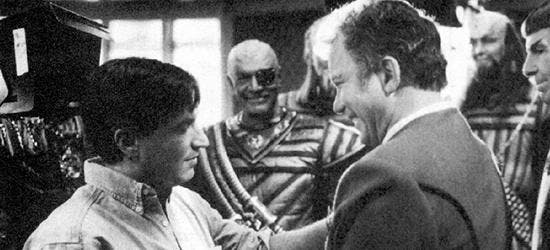
Now, when you think back to the production of Star Trek II itself, what are the first things that come to mind?
MEYER: I don't remember very much about it. It was work. I had a good time with the cast. They were very respectful. I know that, originally, Bill Shatner didn’t like the script at all, and I was very floored by this because everybody else did like it. And I sort of listened to his complaints with mounting alarm, and the form it took was that I just kept having to get up and go to the men’s room. Just kept peeing and peeing and peeing as though I was either very humiliated or very enraged or some combination of both. When he left, I was in a real depression. Harve said, “Well, you know, just a minute. If you parse this into bite sizes, it basically boils down that he wants to be the first man through the door.” So, I could understand that. I went back and 24 hours later I’d done a rewrite, and he was very pleased. And they were all very gracious to me. So, I remember having a pretty good time shooting the movie.Following up on something you said before, Stuart Baird, who directed Star Trek Nemesis, was brought in as the outsider. That was meant to be a positive. “Hey, we don't have an inside guy. It’s not Jonathan Frakes, who’s part of the family. This’ll shake things up a little bit,” because Insurrection hadn't done well. And he was going to make his movie his way, Baird, even telling the established Next Gen actors to do things as their characters that they'd never do. So, how open to your direction were Shatner, Nimoy and the others?
MEYER: Oh, I think they were remarkably open to direction. And I wasn’t… in a way, I wasn’t asking them to do things that their characters wouldn't do. I was just exploring their characters in a little more depth. And they were very helpful in saying, “Well, you know, my character would say it this way,” as opposed to – you know, how I’d written it. There was sort of a learning curve. But they were very used to having different directors come in week after week, and do different episodes of the show. And their professionalism was part of that whole process. And I wasn’t reinventing the wheel character-ologically. I think I was trying to make them be more who they were. So, for example, I was working with these people at this point in their lives, and age became part of the theme of the movie. And, certainly, Number Two is about friendship, old age and death. Those are the subjects, or the themes, at any rate, that were being played with. Putting the glasses on Kirk, and so forth. But I wasn’t trying to make Kirk into a different person. I just took certain ideas from watching the episodes Harve had given me, and was saying, “Well, you know, this guy has never really had to confront the no-win situation. He always sort of wins. So, let’s put him in a situation where he loses.” And just see what that is. The rest of it was about, “Okay. I don't like these sets. I don't like these costumes. I want it to look like a submarine. I want them to talk like they’re in the Navy.” Things like that.
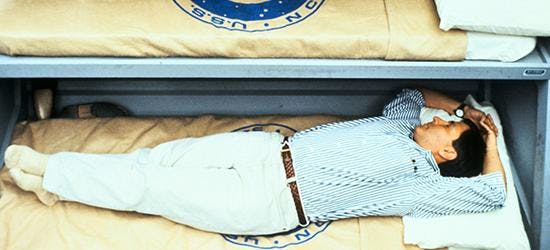
Visit StarTrek.com again tomorrow for part two of our exclusive interview with Nicholas Meyer. And go to www.destinationstartrek.com for details about Destination Star Trek 3.
